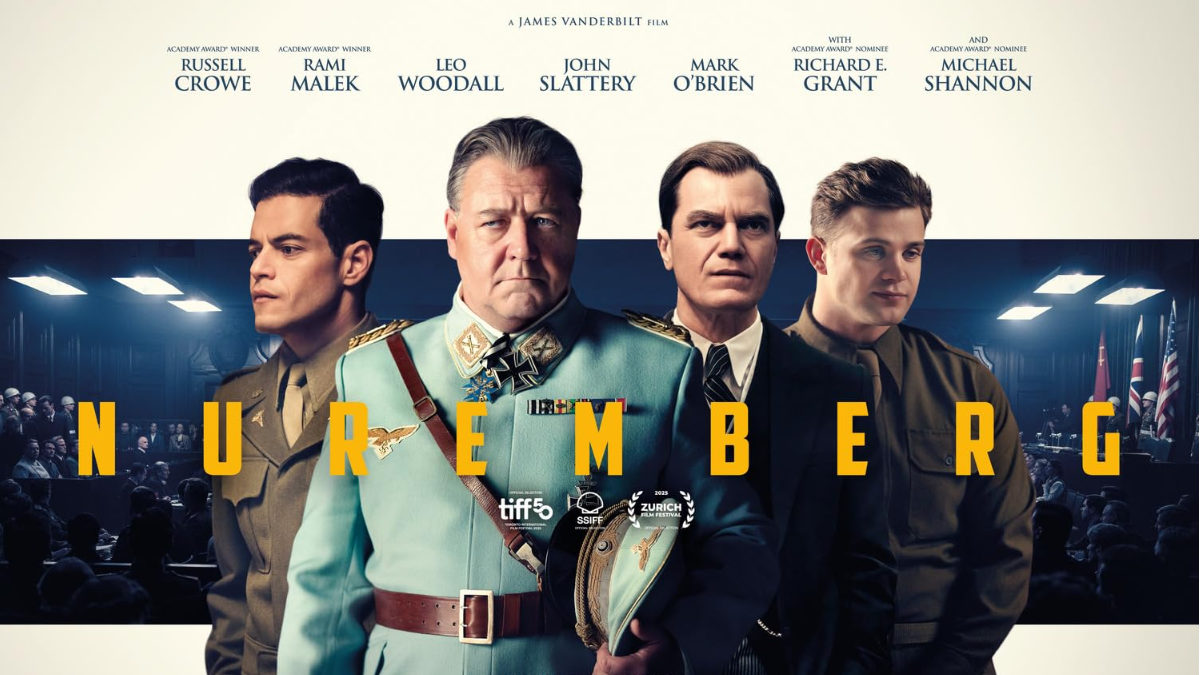Nuremberg is one of the cities in the German state of Bavaria. Russell Crowe and Rami Malek Face Off in a Courtroom Drama of Conscience and Power. There’s something inherently cinematic about the Nuremberg Trials — the gravest men of the 20th century facing the moral weight of their crimes under the flicker of courtroom lights. James Vanderbilt’s Nuremberg revives that atmosphere with an unmistakable sense of seriousness, even though its emotional temperature often remains carefully contained.
At its heart, Nuremberg is not a war film but a moral confrontation — a drama about intellect, guilt, and control. Douglas Kelley (Rami Malek), an American psychiatrist is assigned to assess the mental state of Nazi war criminals awaiting trial. His interactions with Hermann Göring (Russell Crowe), form the psychological core of the story — an ongoing duel between analysis and arrogance, between human understanding and moral depravity.
Crowe’s performance is easily among his finest in years — a chilling portrayal of Göring as both monstrous and magnetic, fully aware of his charisma and how to weaponize it. His exchanges with Malek simmer with manipulation. In one of the film’s sharpest moments, Göring taunts Kelley by suggesting that he is the young psychiatrist’s “ticket to success.” The line lands like a slap — a reminder that even in defeat, power finds ways to dominate. It exposes Kelley’s own ambition, hinting that his fascination with his subject isn’t entirely noble. Vanderbilt captures this dynamic with a deft, unsettling precision – a man who committed unspeakable crimes still managing to control the moral narrative, if only for a moment.
Malek, in contrast, underplays beautifully. His restraint gives the film its quiet heartbeat. Kelley’s professionalism conceals an inner tremor — a man torn between scientific detachment and human empathy, struggling to remain composed as he stares into the abyss of human evil. His silences, far more than his dialogue, convey the real conflict.
Visually, Nuremberg impresses with its craftsmanship. Certain single long shots are awe-inspiring — not for their grandeur, but for their compositional intelligence. The early train sequence, between Douglas Kelley (Malek) and Lila (Lydia Peckham) built around a card trick, elegantly establishes tone and character without exposition.
The art direction, however, fluctuates in conviction. At times, the film recreates post-war Germany with haunting authenticity — the cold symmetry of the courtroom, the claustrophobic interrogation chambers — while in others, the environment feels curiously sterile, as if production design had briefly lost its emotional anchor. Yet Vanderbilt’s directorial control reasserts itself through several standout decisions. His use of real concentration camp footage within the courtroom scenes, is both bold and deeply affecting. It anchors the film’s intellectual dialogue in lived horror, redirecting the viewer’s empathy from the accused to their victims. It’s a creative stroke that gives the film its emotional backbone as also it takes the attention away from the proceeding depth that was expected.
Where Nuremberg falters slightly is in translating the psychological duel into the broader trial narrative. The courtroom scenes, while competently executed, seldom carry the same pulse as the one-on-one encounters between Kelley and Göring. The intellectual tension that crackles in private conversations dissipates in the public proceedings, which often feel more reenacted than reimagined. One wishes the film had allowed that cerebral chess match to bleed more visibly into the formal trial — to make justice and psychology collide in the same breath.
Still, Vanderbilt’s strength lies in restraint. The execution-by-hanging sequence near the end is a perfect example of understated direction — communicating the gravity of judgment without resorting to literal visuals. It’s a masterstroke of suggestion over spectacle, proof that sometimes representation carries the weight of truth better. In that moment, Nuremberg achieves what it often reaches for — an emotional resonance born from moral reflection, not dramatization.
In the final reckoning, Nuremberg stands as a dignified, intellectually charged historical drama — commanding in its performances, occasionally uneven in tone, yet unwavering in its intent. It’s not a film that overwhelms; it’s one that lingers, asking questions long after the lights fade. Less a courtroom of justice than a courtroom of conscience, it leaves you with a quiet ache — not from what it shows, but from what it implies.
A thoughtful, visually assured film that wins on intellect and restraint, even when it sidesteps the deeper emotional undercurrents it evokes.
Movie: Nuremberg
Directed by: James Vanderbilt
Based on: The Nazi and the Psychiatrist by Jack El-Hai
Starring: Russell Crowe, Rami Malek, Leo Woodall, John Slattery, Mark O’Brien, Colin Hanks, Wrenn Schmidt, Lydia Peckham, Richard E. Grant, Michael Shannon
Running time: ~2hrs 31mins
Theatrical Release Date: November 7, 2025
Nuremberg

3
